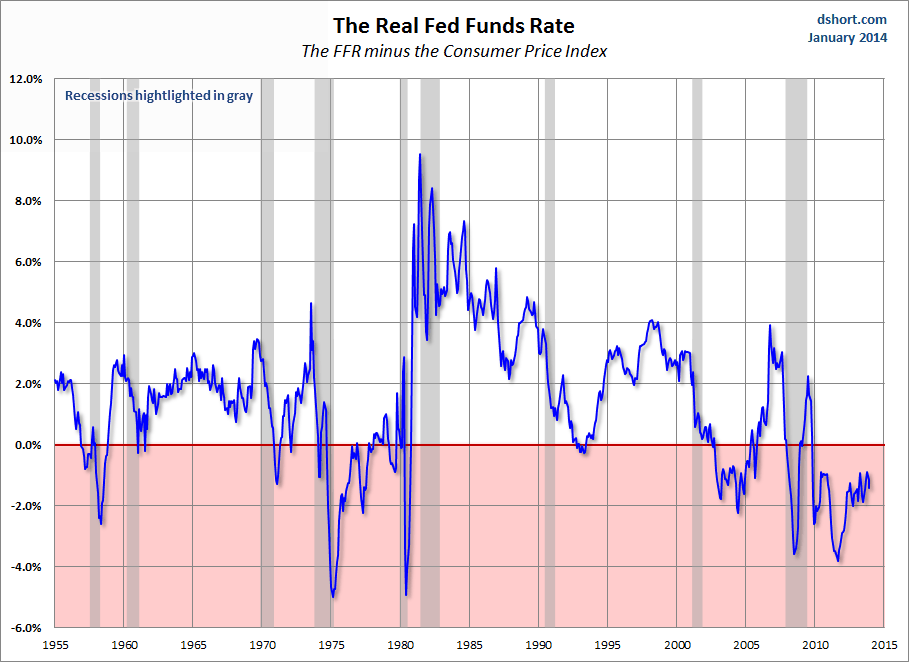I have written many posts concerning asset bubbles as my analyses indicate that:
- many immensely large asset bubbles currently exist
- today's asset bubbles are exceedingly complex in nature
- asset bubbles are largely misunderstood
- asset bubbles pose an immense threat to the financial system
- their future resolution is profoundly problematical
Of course, asset bubbles are often referred to as "speculative bubbles," which is especially apropos.
While asset bubbles form for a variety of reasons, one primary factor in their recent (from a historical perspective) formation is abnormally low interest rates. While there are many ways to depict this, one way is to view the real Federal Funds rate. A recent chart from Doug Short is seen below:
-
As one can see from the above chart, prolonged negative periods of the real Fed Funds rate has proven very problematical in subsequent periods. Whereas in the '70s it led to high inflation, in the early 2000's it first distended the housing bubble, and post-2008 has led to the distension - to grotesque dimensions - of various asset bubbles.
While this negative real Federal Funds Rate factor is a notable one, it should be noted that it is but one of many factors that cumulatively have resulted in a highly fetid "witches' brew."
Despite asset bubbles' problematical aspects, many asset holders have benefited immensely from them. As I mentioned in the January 30, 2012 post, titled "A Note On Asset Bubbles" :
It should be noted that asset bubbles are often widely seen as attractive and/or beneficial during their expansion phase.
However, as I also noted in that post, few people foresaw the longer-term ramifications of the housing bubble, which is especially problematical as the housing bubble's existence was obvious and the consequences of its "deflation" or "bursting" should have been easily envisioned.
Given the (vastly) prolonged nature of some of the current asset bubbles, many undoubtedly see them as being enduring "fixtures" in the financial system. By outward appearances, it would likely seem absurd to even contemplate draconian downside price targets for various asset classes. Similarly, it would seem equally difficult to envision those who are ultra-wealthy suffering vast percentage losses of their net worth.
However, in the United States we do have a prior post-Federal Reserve period in which many ultra-wealthy people "lost everything," with that period being the Great Depression. This loss of wealth was highlighted in the October 7, 2011 post titled "The Plight Of The Wealthy During Depressions."
While, in an overall sense, I believe there to be similarities between the current economic period and that preceding The Great Depression, I do believe that our current economy and financial system on an "all things considered" basis have vastly problematical underlying dynamics that dwarf those existent prior to and during The Great Depression.
_____
The Special Note summarizes my overall thoughts about our economic situation
SPX at 1794.19 as this post is written

No comments:
Post a Comment